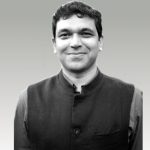Podcast Themes
Multiple perspectives on a topic that you are curious about!

Venkat speaks about how he transitioned from Sony to running Eklavya. He refers to Prof Sunil Handa (who takes the popular course LEM – Laboratory in Entrepreneurial Motivation) sending him a concept note leading to him and Sridhar Rajagopalan quitting their jobs and starting Eklavya. He also refers to the research and the groundwork that went into setting up Eklavya. He also speaks about some of the early challenges involved in setting up the school and in convincing people to send their kids here.

Venkat speaks about his years at IIMA and how his thoughts and beliefs got shaped by some of his friends (Sridhar Rajagopalan and Sunil Khairnar). He also speaks about how the course LEM (Laboratory in Entrepreneurial Motivation) taught by Prof Sunil Handa got him to articulate his direction sharply with the following words “I see myself as an instrument or tool that’s available to society and my choices should be guided by maximising the returns that I will give to the society’

Roopa first talks about what she learnt at IIMA before she delves into what they don’t teach there but should. She talks about the notion of first principles thinking that gets deeply ingrained during the time at IIMA. She goes on to talk about the criticality of work experience before pursuing an MBA.

Anu reflects on the notion of heightened risk in the workplace and sensitizing students to that. She also refers to the need for integrated learning across disciplines and functions given that the big problems that are being solved today lie at the intersection of multiple domains.

Given how hard it is to get into places like IIMA, Rama talks about the mindset of the typical person that’s getting in and how that’s at odds with the climate at the workplace of today. She talks about how one could bridge the gap.

Business Schools (especially in India) often taken in students without prior work experience. Several students that work hard to get into elite business schools often assume that they are job-ready when they graduate. Karthik talks about some of the key elements which are not taught which can have a profound impact on your effectiveness in the workplace

A good education provides a strong starting point at best. Avnish talks about how he has evolved over time through the various experiences he has had and the decisions he has made.

B-school education can often be focused around picking up the “tool-kit” that makes students ready for the world of employment. Prakash talks about some of the non-academic elements that end up mattering so much in the long run.

“The cost of our dreams is much lower than we think it is in our heads!” Using this profound thought Papa CJ discusses what business schools don’t teach us. don’t miss the part about the three things that constitute happiness!

Can competitiveness and calmness reside within you side by side? Why should one’s mind and heart be aligned? Listen on to find out what things, Amish thought, were not taught enough in B-schools.